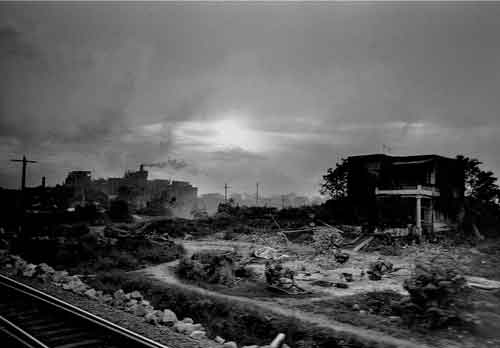The first bullet makes a brand new hole in a history vermilion. Potholes, bullet holes, dark stains upon the paving stones. Months from now, all this will be replaced. Heads, arms, legs, trunks, tanks, guns, bitumen and bicycles. One long row of cycles crashes to the ground. It will be some time before the corpses can be disentangled from the spokes...

photograph from an untitled series by Han Lei
He didn’t see the photos until three years later. Three years after the images were captured on film, beamed around the globe. Three years to the day the rest of the world saw them, and stopped.
Three years to the day, the world stopped.
It does that now and then. Wheels get stuck, parts gum up, whole works come grinding to a halt. Stop, full stop. History is full of full dead stops.
But nothing ever stops for long. The world might pause for a second or two, just long enough to catch you at your breath, or to let you hear the sound of someone else’s breathing. Long enough to let you hear the door closing behind you, the latch falling into place, the bolt being driven home. Just long enough to hear the shutter click.
Click. You know the photographs I’m talking about. You must have seen them a thousand times.
Knots of weary people, scattered piles of blankets, a thousand makeshift tents. Hand-lettered posters, a borrowed megaphone. Triumphant smiles, a jubilant thumbs-up. Hastily-called strategy meetings, a huddle of serious faces. Teenaged couples dancing, a swirl of summer jackets, the young woman caught forever, frozen in mid-twirl. Students, teachers, factory workers, people in the streets. Parents with concerns, soldiers with sympathies, residents with petitions, bus drivers with a smile and a shrug, refusing fares. Foreign correspondents with camera crews in tow, working toward a deadline. Students from the art academy, carrying their tall white plaster goddess, her paste not dry upon their hands.
Those were the first images. There were others, the ones that came too late.
Smoke rising from the periphery. The rumble of tanks. Too many soldiers for this early morning hour, too many people for these broadcast warnings. Too many decisions to be made, steps to be taken, movements in directions from which there is no coming back. The first bullet makes a brand new hole in a history vermilion. Potholes, bullet holes, dark stains upon the paving stones. Months from now, all this will be replaced. Heads, arms, legs, trunks, tanks, guns, bitumen and bicycles. One long row of cycles crashes to the ground. It will be some time before the corpses can be disentangled from the spokes.
There are so many people on the street, so many passers-by. Why don’t they say something? Are they saying something? What would they say if they could speak?
Can you, can’t you hear their voices now?
Of course you can’t.
No one here is talking, and all that’s left are pictures.
